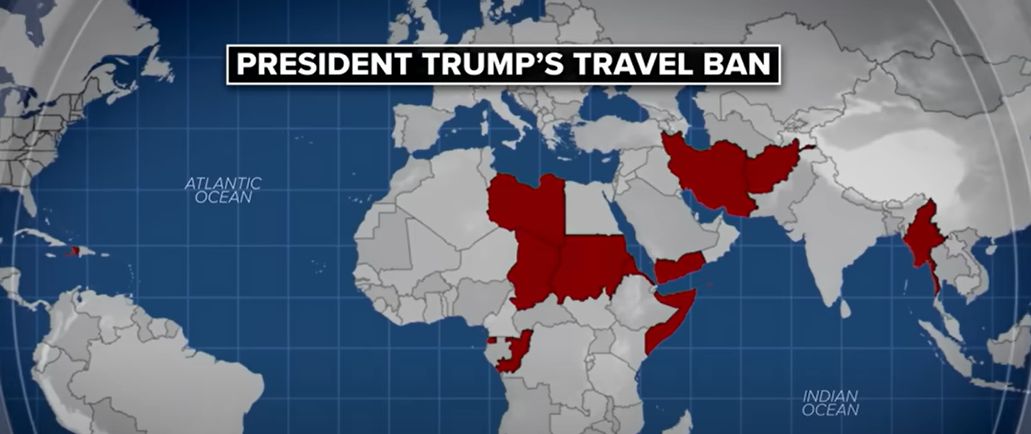On June 9, the U.S. reinstated a travel ban on 12 countries — not for ideological flash, but for measurable risks: failed vetting, terrorism links, and biometric failure called out for a new policy.
Countries like Iran, Afghanistan, Syria, and Somalia are now blocked — but not without cause. Iran and Syria have repeatedly failed to share real-time intelligence on known extremists. Afghanistan’s collapsed governance makes identity verification nearly impossible, while Somalia was cited in DHS reports for issuing thousands of untraceable passports.
Beyond politics, there’s the human cost. Over 8,500 migrants died globally in 2023 — many via smuggling or unsafe crossings.
These aren’t policy preferences — they’re security gaps with fatal potential. This isn’t arbitrary. It’s driven by data: DHS recorded 565,155 visa overstays in FY 2023 — more than the population of Reno — with 510,000 still unaccounted for. These overstays have now quietly outnumbered southern-border illegal crossings every year since 2016. (RELATED: Unseen, Unchecked, Unsafe — America’s Visa Overstay Problem)
The trigger was the Boulder firebombing on June 1, 2025, when 26-year-old Mohamed Sabry Soliman, an Egyptian national on an expired B1/B2 tourist visa, threw two Molotov cocktails at a Colorado event supporting the hostages held by Hamas, injuring 12. Soliman had overstayed by over three years. DHS records indicate that despite multiple flagged entries in DHS’s Arrival and Departure Information System (ADIS), no removal proceedings were initiated. It wasn’t merely a policy failure — it was a breakdown in enforcement, tracking, and political will. (RELATED: Get Rid of Habiba Soliman)
Today’s enforcement is tech-driven. AI scans passports and behavioral patterns, flagging anomalies in real time. Risk scores determine tiered bans. Passports aren’t manually checked — they’re algorithmically vetted. (RELATED: How Student Visas Became the New Trojan Horse for Immigration Fraud)
The 2017 travel ban was chaotic but effective. Visa overstays from targeted countries dropped by 38 percent. In response, Somalia digitized passports, and Ethiopia adopted Interpol biometric protocols. Trump v. Hawaii (2018) affirmed presidential power under INA § 212(f) to restrict entry when deemed in the national interest.
Under Biden, border enforcement buckled: 2.4 million illegal crossings occurred in 2023 — the highest in U.S. history. In 2024, 736 individuals on the FBI’s terror watchlist were intercepted at U.S. borders.
The fiscal fallout is no less urgent. New York City spent $4.3 billion on migrant services in 2024. California’s costs neared $31 billion, and Illinois topped $3 billion. The national cost of illegal immigration — $151 billion annually, a 30 percent rise since 2017.
A Sound, Fair Travel Ban
This isn’t racism — it’s arithmetic. Nations unable to verify citizen identities — Iran, Syria, North Korea — face full bans. Others, including Pakistan and Nigeria, face conditional restrictions pending compliance.
This isn’t just domestic policy — it’s foreign policy. The African Union condemned the ban for undermining academic and diplomatic ties. Chad suspended visas for U.S. citizens, citing “national dignity.” Iran’s Supreme Leader called the policy “supremacist,” while Venezuela accused the U.S. of “weaponizing border policy.” Somalia, meanwhile, pledged biometric reform to align with U.S. standards. (RELATED: Trump’s Populist Immigration Stance Is Emboldening Countries Worldwide)
Beyond politics, there’s a human cost. Over 8,500 migrants died globally in 2023 — many via smuggling or unsafe crossings. Mariam from Chad was one: abandoned in Libya by traffickers, rescued by Italians, and denied asylum due to document failure. Policies that prioritize order over desperation aim to prevent fates like hers.
And unlike prior versions, this ban includes key exemptions: green card holders, Afghan SIV recipients, persecuted minorities, and dual nationals. This is not a wall — it’s a filter.
The legal foundation remains clear. Trump v. Hawaii remains precedent. The DHS algorithm is operational. And the international backlash-however loud — is evidence that this doctrine matters.
The firewall is up. It’s a strategic threshold-powered by code, backed by law, and already reverberating from Chad to Caracas.
READ MORE from Kevin Cohen:
























